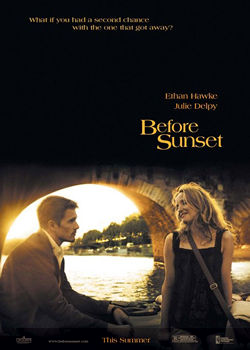Before Sunset
 Richard Linklater’s Before Sunset (2004) follows its predecessor by nine years in terms of both the real-time and film-time that has elapsed since Before Sunrise (1995), so that the reunited characters of Jesse (Ethan Hawke) and Cèline (Julie Delpy) are now in their early thirties. Meeting up at a Parisian book signing where Jesse is promoting his fictionalized account of that night so many years ago, the two again roam the streets and talk in the few hours before Jesse returns to America. Here in this film, though, the conversations are weighted by the irreversibility of time and guarded by the emotional damage that each has sustained. Before Sunset shatters the idea of an idealistic romance even as it creates one.
Richard Linklater’s Before Sunset (2004) follows its predecessor by nine years in terms of both the real-time and film-time that has elapsed since Before Sunrise (1995), so that the reunited characters of Jesse (Ethan Hawke) and Cèline (Julie Delpy) are now in their early thirties. Meeting up at a Parisian book signing where Jesse is promoting his fictionalized account of that night so many years ago, the two again roam the streets and talk in the few hours before Jesse returns to America. Here in this film, though, the conversations are weighted by the irreversibility of time and guarded by the emotional damage that each has sustained. Before Sunset shatters the idea of an idealistic romance even as it creates one.We learn that Cèline was unable to meet Jesse at the train station those six months later, since her grandmother had just passed away. As a result, Jesse returned to America heart-broken and put his time into constructing the novel that recounts their extraordinary night, and, additionally, is married and has a son, while Cèline became involved in the environmental protection group Green Cross.
Whereas their conversations often revolved around idealistic impressions in the earlier film, now more adult questions of marriage, responsibility, time, and care dominate their discussions. These intimate details slowly reveal how much each still loves and desires the other, so that when one of them glances away from the other for a moment, the other is always moved to touch them. This, of course, leads the audience to realize that the responsibility of marriage must not be all that binds a couple together, that there must be genuine love and appreciation behind that responsibility, otherwise all the commitment is barren of its pure intent.
Their scene in the taxi brings about the film's first peak, when the words of Jesse and Cèline become imbued with pain and hatred. The easy rhythm that both characters have been operating under is suddenly revealed to be falsehood, and each character no longer talks around their regret, but instead thrusts that regret against the other, willing them to react. It's a powerful, naked moment of disclosure, and perhaps the best scene in the film.
Before Sunset unfolds under real-time narrative, so that the audience always knows that Jesse and Cèline’s encounters will soon be cut short, that, as the sun fades, so too does the chance of the two finding peace. Yet Linklater, Hawke, and Delpy (who all co-wrote the screenplay) love their characters too much to surrender to a melancholic ending, and give their characters the send-off that audiences have waited nine years for, even as it forces those same audiences to come to terms with the morality of that decision.
Recapturing the most magical moments of the first film (witness the parallel between the wordless glances back and forth in the record store listening station in Before Sunrise and the stairway sequence in Before Sunset, when their attraction is mutually realized), while creating new moments (Cèline’s waltz that she plays for Jesse), Before Sunset is a masterpiece of contemporary adult romance, identifying all that we love about film and rewarding us with a vision that is never condescending to romance or life itself.
Before Sunset: 10/10

0 Comments:
Post a Comment
<< Home